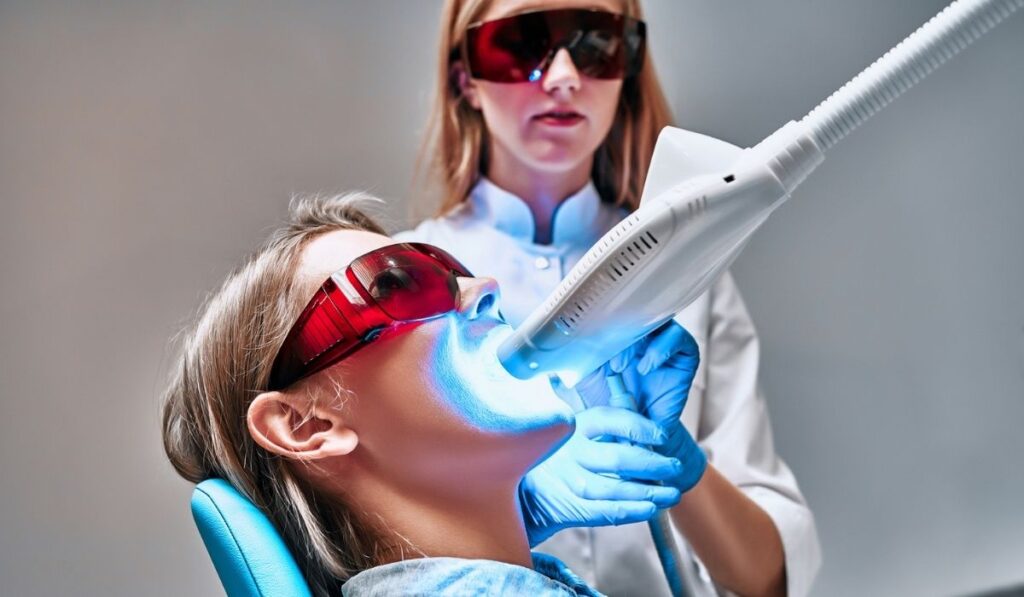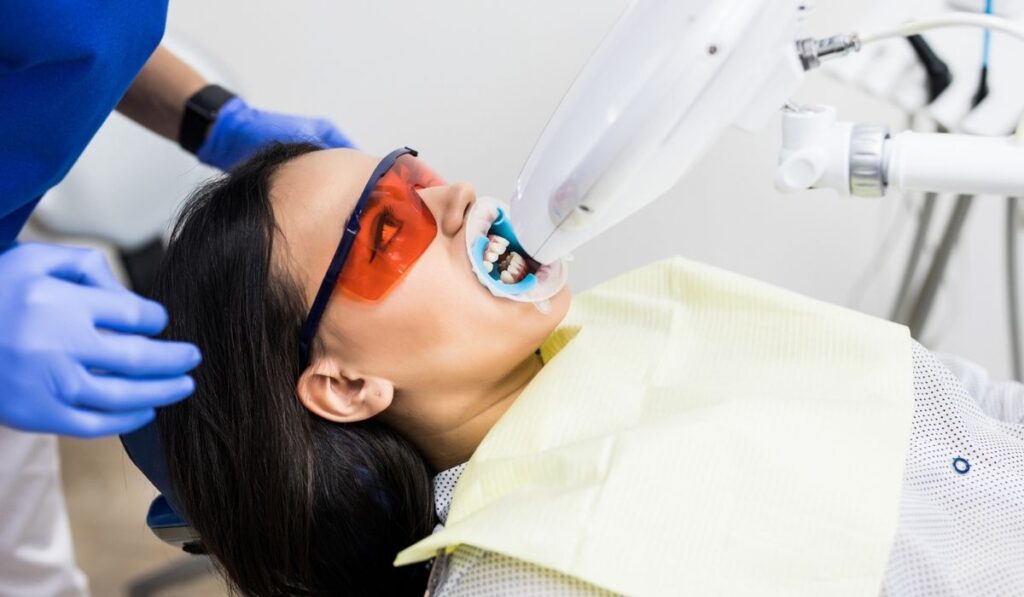Professional teeth whitening and at-home whitening kits are gaining popularity. These straightforward procedures are effective ways to improve the appearance of your smile, lift stains, and remove discoloration. Laser teeth whitening is one such procedure that you may have heard of, but what exactly does it involve?
Laser teeth whitening is a cosmetic procedure done at a dentist’s office. During the procedure, a bleaching gel is placed on your teeth. Your dentist will then activate the bleaching gel using heat from a pen-like laser. The procedure requires prior approval and can lead to temporary sensitivity.
Although a laser burning the stains from your teeth may sound a bit frightening, the procedure is effective and safe. However, like all other teeth whitening methods, there are a few risks and precautions to be aware of. Here’s everything you need to know about laser teeth whitening.
What is Laser Whitening and Where Can You Have it Done?

Laser teeth whitening is a cosmetic procedure done at the dentist’s office. During the procedure, a bleaching gel is placed on your teeth. Your dentist will then activate the bleaching gel using heat from a pen-like laser.
The bleaching gel will start to foam, effectively removing the stains from your teeth. The bleaching gel may be left on your teeth for a few minutes before being removed. Your dentist may repeat this process up to three or four times until your teeth are adequately whitened.
Is Laser Whitening Safe for Your Teeth?
Most dentists consider laser teeth whitening a safe procedure. It can only be done every 4-6 months and is unlikely to cause adverse side effects. However, like other procedures, you should be aware of a few risks and precautions:
Stick With a Trusted Professional
Laser teeth whitening uses a gel that has high concentrations of bleach. If misapplied, the high amounts of bleach can burn the soft tissues of your mouth, including the gums, lips, and tongue. Your dentist will use special tools and apply a protective layer to these areas to avoid this.
Because of these risks, it’s crucial to have this procedure done by a trusted professional.
Get a Consultation
You’ll need to consult with your dentist before you can undergo laser teeth whitening. Your dentist will make sure your teeth, gums, and mouth are healthy enough to receive the procedure. Children under 16, pregnant women, and individuals with sensitive teeth may be ineligible for laser teeth whitening.
You May Experience Sensitivity and Irritation
The most commonly reported side effects of laser teeth whitening are increased sensitivity, irritation, and general discomfort. Many patients experience ‘zingers,’ a short-lasting shock or sharp sensation throughout the teeth. Zingers occur randomly and tend to take place within 24-36 hours after the initial procedure.
Although most of these side effects aren’t severe, it’s essential to consult your dentist before beginning.
How Long Does Laser Whitening Last?
The benefits of laser teeth whitening typically last up to six months or longer. However, every person is different, so your mileage will vary. The amount of time your teeth remain whitened depends on your tooth structure, personal diet, habits, and your overall oral health.
Remember: Because laser whitening isn’t a very abrasive procedure, it won’t last quite as long as other whitening methods.
Is Laser Whitening Expensive?
Professional laser teeth whitening is much more expensive than at-home treatments. The price can vary from $450 to $1,000 per treatment. However, this price will depend on your dentist’s location, the frequency, and where you have it done.
Can You Use Dental Insurance for Laser Teeth Whitening?
Unfortunately, your dental insurance won’t cover in-office teeth whitening. Professional teeth whitening is considered a cosmetic procedure, meaning it isn’t medically necessary.
Like other unnecessary medical treatments, the patient must pay the total cost for teeth whitening. This is one of the reasons laser professional teeth whitening can be so expensive.
Are There Other In-Office Treatments Available?

Most professional whitening services have similar components. However, not every procedure will use lights or lasers. Here are some of the most common professional teeth whitening methods available:
Zoom Whitening
Zoom teeth whitening is a minimally invasive procedure that takes around 45 minutes to an hour. The process uses a combination of bleach and light to brighten the color of your teeth.
During a Zoom whitening session, your dentist will protect the soft tissues of your mouth with either a gel or shield. From there, your dentist will apply a bleaching agent and use a special blue light to create a chemical reaction, brightening your teeth in the process.
Zoom teeth whitening typically costs anywhere from $300 to $600 per treatment. Like all other professional teeth whitening procedures, Zoom whitening can cause temporary sensitivity and discomfort.
Boost Whitening
Another standard procedure is Opalescence Xtra Boost, or Boost for short. Boost is a minimally invasive teeth whitening procedure that treats discoloration and lifts surface stains.
Boost whitening doesn’t use a light or laser. Instead, the procedure calls for a bleaching gel with a high concentration of hydrogen peroxide. The active ingredients found in the gel pass through your teeth, oxidizing any discolored molecules and removing stains.
Boost has a lower risk of sensitivity than other procedures due to the active ingredients. Opalescence Xtra Boost typically costs around $300 to $500 per treatment.
Should You Get Laser Teeth Whitening?
Laser teeth whitening is a safe and effective cosmetic procedure. Your dentist will remove and lift stains through the use of gels, lights, and/or lasers.
However, this treatment can be pretty pricey and isn’t covered by dental insurance. Be sure to consult your dentist before making any appointments or decisions.


